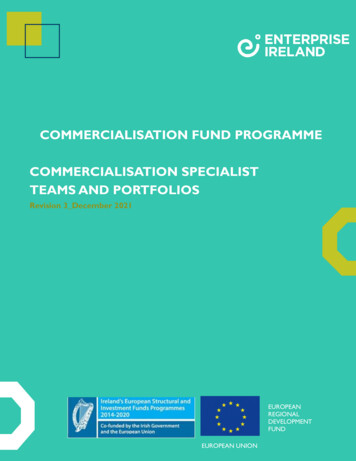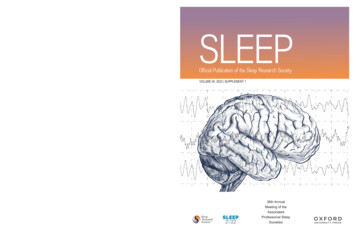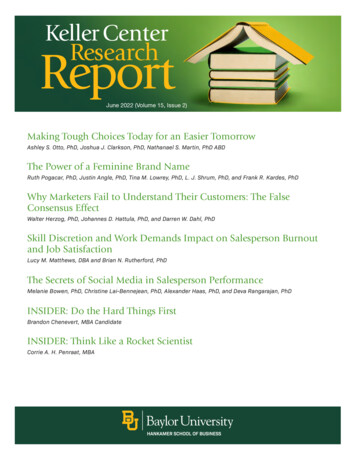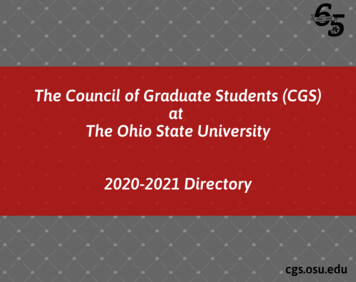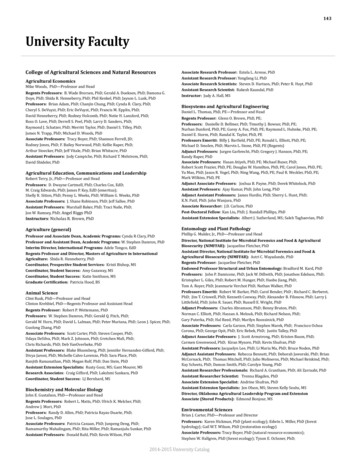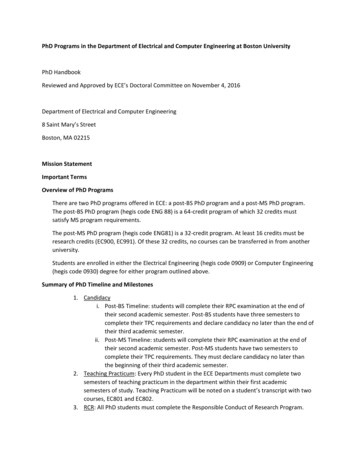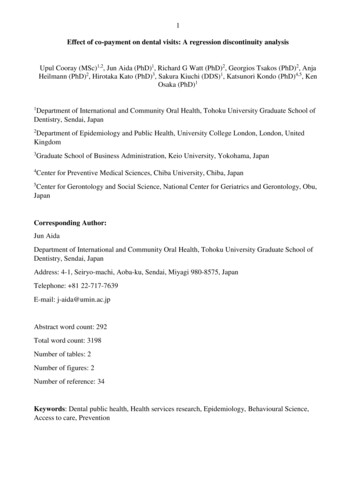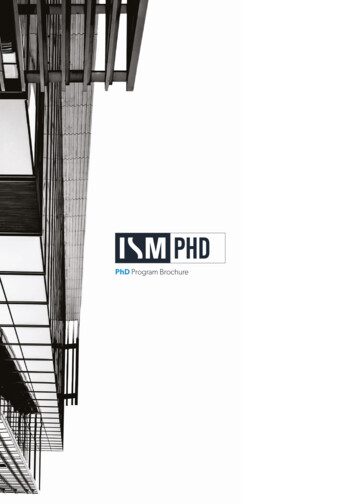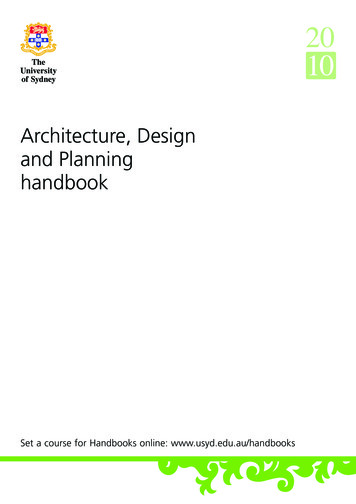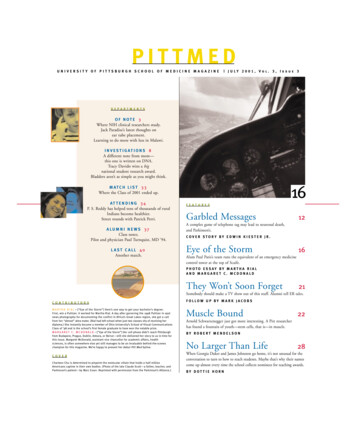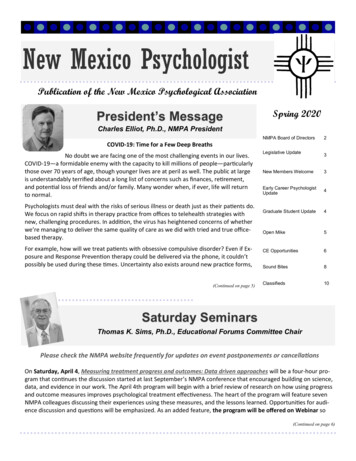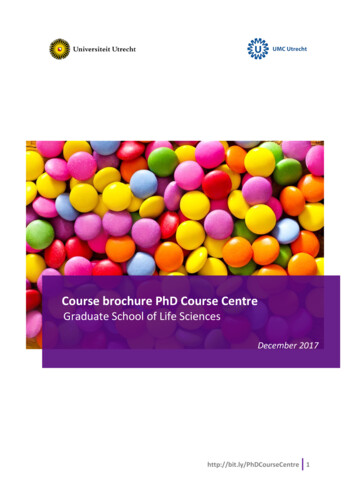
Transcription
Course brochure PhD Course CentreGraduate School of Life SciencesDecember 2017http://bit.ly/PhDCourseCentre 1
ContentsPreface . 41. Research Skills and Knowledge . 71.1 Introductory Biostatistics for Researchers . 81.2 Systematic Literature Searches (workshop) . 91.3 Ten reasons to make your research data open (workshop) . 101.4 Data handling in R (workshop) . 112. Responsible Conduct of Science . 122.1 Dilemmas in Science – in preparation . 132.2 Research Data Management (workshop) . 142.3 That Thing Called Science . 153. Personal Effectiveness . 163.1 Personal development and competencies during your PhD (workshop) . 173.2 Achieving your goals and performing more successfully during your PhD . 183.3 Mindfulness and Stress Reduction. 193.4 Intercultural Communication . 203.5 Interpersonal Communication . 213.6 Intervisie voor promovendi (in Dutch) . 223.7 Mental Health – in preparation . 233.8 Stress Management . 244. Communication . 254.1 Analytic Storytelling . 264.2 Writing a Scientific Paper . 274.3 Writing a Scientific Paper (online course). 284.4 Writing for Academic Publication . 294.5 Academic Writing in English. 304.6 The Art of Scientific Writing . 314.7 Giving Effective Oral Presentations . 324.8 The Art of Presenting Science . 334.9 Science Communication: Relevant and Clear . 344.10 Writing Successful Grant Proposals (online course) . 354.12 Breaking Science . 364.13 Basics of Adobe Indesign . 385. Career Development . 395.1 BioBusiness Summer School . 405.2 Entrepreneurship in Life Sciences and Health . 415.3 ‘Selling’ your Science. 425.4 Honest Networking (workshop) . 435.5 Improving the Impact of your LinkedIn Profile (workshop) . 445.6 PhD Event . 455.7 PhD Day . 465.8 PhD Activating Career Event (PhACE) . 475.9 Research Funding Days . 486. Leadership and Management . 496.1 Research Planning and Time Management . 506.2 Time Management (workshop) . 512http://bit.ly/PhDCourseCentre
7. Teaching . 527.1 Supervision of Master's students. 537.2 Teaching Life Sciences (workshop) . 548. For supervisors . 558.1 Cross cultural Challenges in PhD supervision . 568.28.38.4Supervision of PhD candidates in the Graduate School of Life Sciences – in preparation . 57At the Helm: how to get the best out of you research group – in preparation . 58Best practices for supervisors – in preparation. 59http://bit.ly/PhDCourseCentre 3
PrefaceThe PhD Course CentreThe PhD Course Centre of the Graduate School of Life Sciences (GS-LS) was established in January2015. Our programme is meant to shape your skills according to the PhD Competence Model, whichfocuses on general scientific skills, responsible conduct of science, communication, personaleffectiveness, leadership & management, teaching, and career development. In addition we offersupport for supervisors (promotores and copromotores) to get the best out of their research team.At present, we are still expanding our portfolio of courses, training and workshops.CoursesOur courses are meant to help you in your current research project and in your future career, be it inresearch or otherwise. Topics covered include general scientific skills, communication,entrepreneurship, personal development and career development. These courses complement ourPhD programmes and PhD events.Course feeStarting from 2018, the PhD Course Centre needs to charge course participants a modest fee. Wewill handle two types of course fees: one for internal PhD candidates and one for externalparticipants. Please note that you can use your personal course budget of 400/year ( 1,600 max) topay for these courses. This budget is managed by your department (faculty of Science/VeterinaryMedicine) or your Division (UMC Utrecht).Guideline: 20 ECYou are strongly encouraged to collect 20 EC in courses (or 5 EC per year of research employment),but attendance of these courses is on a voluntary basis. It is our pride to provide a collection ofcourses that is so attractive that you are happy to take some time off your busy schedule and attendsome of them. Our courses cover a range of topics, including general scientific skills, communication,entrepreneurship, personal development and career development.Warning: You will be charged half the course fee if you cancel your registration too late, or if youdo not attend the course for which you have registered.RegistrationYou can register via the website of the PhD Course Centre: http://bit.ly/PhDCourseCentre.Click on the course, workshop or seminar of your interest, read the course information, and scrolldown to the bottom of the page. Here you will find a link to the registration form.Course updatesYou can sign up for our biweekly PhD Course Centre update by clicking this link.Suggestions?We are currently in the process of setting up the PhD Course Centre and we will regularly updatethis guide. Your feedback on courses you attended is very welcome, as are suggestions for newcourses. Please send them to pcc@uu.nl.Kim van den Heuvel-Taverne, MSc, Coordinator PhD Course Centre, GSLS4http://bit.ly/PhDCourseCentre
Ilse van der Mark, MSc, Coordinator PhD Course Centre, GSLSSaskia Ebeling, PhD, Coordinator of Doctoral Education, GSLSMore information and interesting links:@phdcoursecentregslsbit.ly/GSLS LI@UU GSLSPhD Course Centre (course seCentre 5
6http://bit.ly/PhDCourseCentre
1. Research Skills andKnowledgehttp://bit.ly/PhDCourseCentre 7
1.1 Introductory Biostatistics for ResearchersCourse descriptionThis course provides an introduction in statistical methodology and discusses several statisticaltechniques for practical data analysis. Statistical fundamentals are reviewed and expanded uponwith multi variable regression analysis of Variance (ANOVA). Concrete examples and case studies areused to apply the theory to practical situations.In general, the daily schedule of the course includes morning lectures from 09.30 to 12.30 h,followed by computer sessions in the afternoon from 13.30 to 17.00 h. Examples from medical andbiological research will be used in the exercises. Datasets will be analyzed on computers using thestatistical software packages R and SPSS (provided by the course organizers).Prerequisite knowledgeAlthough active statistical knowledge is not a prerequisite, we assume some basic knowledge onstatistics and mathematics: the concepts of population and sample histogram, boxplot, frequency table, scatterplot mean, median variance, standard deviation, range, interquartile range, standard error of the mean probability, probability distributions (especially the normal distribution)TrainerC.L.J.J. (Cas) Kruitwagen - Department of Biostatistics and Research Support,Julius Center, UMC UtrechtMax. number of participants16Expected time investmentTwo weeks full-time, including homework.Number of credits3.0 ECCourse CertificateAfter active participation during the whole course (morning and afternoon sessions) you will receivea course certificate.Course fee iCourse fee internal PhD candidates: 250. Course fee external participants: 1400.8http://bit.ly/PhDCourseCentre
1.2 Systematic Literature Searches(workshop)Short descriptionWhen searching the literature, either for a quick answer to a research question, a critically appraisedtopic (CAT) or a systematic review, it is important not to miss relevant articles. In this hands-onworkshop the necessary techniques will be covered.What you will learnAttention will be given to sharpening your research/clinical question, followed by framing it intoPICO (Patient-Intervention-Comparison-Outcome) or DDO (Domain-Determinant-Outcome) format.Then techniques on how to search databases like PubMed, Embase, Cochrane Library will be shown.Saving your search results in literature management software and fine-tuning by means of citationsearching in Scopus and Web of Science will also be covered.TrainersBianca Kramer, PhD and drs. Paulien Wiersma (Subject specialists Life Sciences and Medicine atUtrecht University Library)Max. number of participants20Expected time investmentThis workshop takes 1 hour 45 minutesNumber of credits0.07 EChttp://bit.ly/PhDCourseCentre 9
1.3 Ten reasons to make your research dataopen (workshop)Short descriptionIs your research data valuable still when your project has ended? Probably it is. Ten reasons why youshould not keep your data private.What you will learnIn this workshop we will pass along different aspects of open research data. What are currentdevelopments in rules and regulations for data sharing and making data available? How do youdismantle obstacles to make data open? How do you actually share and make data available? And,what exactly is in it for you? With the provided background you will be able to make informeddecisions on when to prepare what in order to open up and share your research data, and why youshould at all.TrainerTessa Pronk (RDM support) (Data and Information Specialist, Utrecht University Library)Max. number of participants12Expected time investmentThis workshop takes 1 hour 30 minutesNumber of credits0.05 EC10http://bit.ly/PhDCourseCentre
1.4 Data handling in R (workshop)Short descriptionHandling raw towards consistent data is a crucial step in your research. This should be donethoroughly and transparently. For this purpose, R is a very useful software tool. This workshopcovers the basics of raw data handling in R.What you will learn Steps in preparing your data for analysesHow to perform these steps in RUltra-quick tour of RstudioGood coding practicesThe workshop offers a concise hands on introduction to raw data handling in R, with ready-madeexamples. At the end you have a good idea on the theory of transforming, checking, cleaning, andrearranging your data. You will have a basis for a further understanding of coding in R, how todocument your code, and you will have a working script for an example.TrainerTessa Pronk (RDM support) (Data and Information Specialist, Utrecht University Library)Max. number of participants10Expected time investment4 hoursNumber of credits0.2 EChttp://bit.ly/PhDCourseCentre 11
2. Responsible Conduct ofScience12http://bit.ly/PhDCourseCentre
2.1 Dilemmas in Science – in preparationhttp://bit.ly/PhDCourseCentre 13
2.2 Research Data Management (workshop)Short descriptionManaging your data well is a basic research skill. Data management concerns the preparation,handling and storing of research data.What you will learnIn this workshop we will pass along different aspects of good data management. With thisbackground you will be able to make informed decisions on what to prepare for your research data,how to best handle it, and how to preserve and possibly share it after your research. The workshopalso is appropriate if you want to learn how to fill in a Data Management Plan.TrainerTessa Pronk (RDM support) (Data and Information Specialist, Utrecht University LibraryMax. number of participants13-20 (depending on the course location)Expected time investmentThis workshop takes 2 hours 30 minutesNumber of credits0.1 EC14http://bit.ly/PhDCourseCentre
2.3 That Thing Called ScienceCourse descriptionIn modern life, science is everywhere. The products of biomedical science and technology may helpachieve a healthy society and economic progress. They may prolong life and make it more agreeableat the same time. But how much do we really know about the production, implementation andevaluation of scientific knowledge? What, exactly, is the basis for our belief in science? What sets itapart from common knowledge? Who should we trust in case two scientists disagree in a hotlydebated issue? Is science a vocation or just another profession? Is scientific knowledge somethingspecial to be emulated, or ‘just another opinion’? How does science really work? Are scientific factsdiscovered or rather socially constructed and considered ‘true’ only after fierce debate? How arescience and technology embedded in society and how do they change over time?If you want to become a scientist – either an academic researcher or a scientifically educatedprofessional with a job outside academia -, you should be aware of these and similar questions. Youshould not just know about the contents of scientific knowledge, but about its context as well.What you will learnThis course sets out to create that awareness, aiming for broad scientific literacy. In nine Fridayafternoon sessions, the historical, philosophical, sociological, commercial, ethical, political andpersonal dimensions of the biomedical sciences will be discussed.For every session, five participants will be appointed as (collective) chair. Together, you areresponsible for the quality of the debate and the success of the meeting.TrainerDuring each session two speakers, who are experts in their field, will set the scene for a highlyinteractive session.Course coordinator: Prof. Frank Huisman, PhD - History of Medicine, UMC UtrechtMax. number of participants45 (a letter of motivation is part of the selection procedure)Expected time investmentApproximately 30 hours (attendance and preparation).Number of credits1.0 ECCourse certificateYou will receive a course certificate if you attend at least 7 out of 9 sessions. You areexpected to be active as participant, which means that you prepare the topic and, evenmore important, that you take part in the general discussion.Course fee iInternal PhD candidates: 125, External PhD candidates: 500http://bit.ly/PhDCourseCentre 15
3. Personal Effectiveness16http://bit.ly/PhDCourseCentre
3.1 Personal development and competenciesduring your PhD (workshop)Short descriptionDoing a PhD is a wonderful learning opportunity. You will grow to be an independent researcher.However you can get overwhelmed by the amount of work and developing some specificcompentencies often has low priority. The key is to plan your personal development, so that you areoptimally ready for your next job when you get your PhD. Recently a clear set of competences wereassembled that every PhD student should have when they are finished.What you will learnDuring this workshop we will work with you to plan the development of these competences. We willhelp you to find the real goal of your PhD and what you would like and need to develop to reach thisgoal. You will reflect on your key values and qualities you already have. At the end of the workshopyou will have a clear plan to develop the needed competencies to finish your PhD with success andbe ready for the next step.TrainerLouise Mennen, PhD (Mennen Training and Consultancy)Max. number of participants15-20Expected time investmentThis workshop takes 2 hours 30 minutes.Number of credits0.1 ECCourse certificateYou will receive a course certificate after active participation during the workshop.Course fee iInternal PhD candidates: 25, External PhD candidates: 75.http://bit.ly/PhDCourseCentre 17
3.2 Achieving your goals and performingmore successfully during your PhDCourse descriptionThis personal development course aims to help you become more effective in your PhD project.We’ll discuss how to set good goals and achieve them, how to improve your interaction, how to getthe most out of the people that you work with, and how to best manage your time and the risks inyour project. Along the way, you will gain important insights into your personality, your personalstrengths, and your pitfalls. For an overview of the subjects discussed in each session, please refer tothe full course description on our website.What you will learnAfter this course, you will: Have acquired a valuable set of tools that will serve you in your work, such as the ability toset clear and effective goals, and to better manage time and risk; Have a clear sense of your drivers, strengths and skills, guiding your future (career) choices; Be more proficient in how you cooperate with people and how you interact with them inorder to get things done and attain your goals.TrainersMichiel and Jacques Jongerden – Exergy Training (http://www.exergy-training.nl/)Max. number of participants14Expected time investmentApproximately 30 hours (attendance and preparation).Number of credits2 ECCourse certificateYou will receive a course certificate after attending all training sessions and active participation.Course fee iInternal PhD candidates: 150, External PhD candidates: 750.18http://bit.ly/PhDCourseCentre
3.3 Mindfulness and Stress ReductionPlease note: this course is taught in both Dutch and English (check our website for details)Course descriptionOur habitual, automatic and unconscious patterns of reacting to stressful situations are known to bea source of stress, both at work and in our personal life. The aim of this course is to get to fullyunderstand this process, to gain insight into our own automatic patterns, and to acquire alternative,more flexible ways of responding to situations that repeatedly have been stressful to us in the past.The skills learned in this course can be practiced after the course, and thus help to prevent(work)stress from accumulating and becoming a health problem in the future.What you will learn skills to pay attention to the present moment-to-moment experience of bodily sensations(including breathing), thoughts, and emotions.awareness of unpleasant sensations, emotions and thoughts and how our habitual ways ofreacting to these are a cause of stresshow to stop these automatic patterns of reacting to difficult situations, and respond in amore effective and flexible way insteadphysiology of stresshow self acceptance, self kindness and self care are helpful to recognize and respectfullytake care of one’s personal boundaries (learning ‘to say no’ to what is unacceptable for you)stress in interaction and communication with othersThe course consists of 8 weekly sessions of 2.5 hours, plus an extra session of practicing ‘silence’, inwhich all aspects of what is learned comes together. Participants are asked to practice one houreach day at home. The willingness to do this is necessary to participate. The effect of mindfulnesshas been widely studied, and it is recommended to not participate if you suffer from or have: acute,serious depression, psychosis, serious addiction (alcohol/drugs), negative attitude towardsmeditation. Participants will fill out a small questionnaire. The trainer may decide to exclude anyonefrom participation based on this information.TrainerMarjan Ossebaard, Instituut voor Innovatie en Leren (http://www.i2l.nl/)Max. number of participants12Expected time investmentWeekly meetings of 2.5 hours and daily exercises. In total you will invest 85 hours in a period of 9weeks.Number of credits2.0 ECCourse certificateYou will receive a course certificate after attending at least 7 course sessions.Course fee iInternal PhD candidates: 225, External PhD candidates: 500.http://bit.ly/PhDCourseCentre 19
3.4 Intercultural CommunicationShort descriptionIf you would like to understand someone it is important to understand yourself: what is, in myopinion, 'normal' behavior? What are the values which I have been raised with? What is myjudgment if someone else behaves 'abnormal'?This workshop focuses on cross-cultural communication. This is based on knowledge of manyfactors, such as other culture's values, perceptions, manners, social structure, and decision-makingpractices, and an understanding of how members of the group communicate - verbally, nonverbally, in person, in writing, and in various business and social contexts.What you will learn During this workshop you will gain insight in cultural differences, both at work and inprivate.Foreign PhD candidates will learn more about the Dutch ways and usualmanners, understand Dutch behavior and feel more 'at home' in the Netherlands.Dutch participants will gain perspective on the Dutch standard of 'normal behavior', helpingthem to become aware of that behavior and change it when in contact with foreigncolleagues. This workshop is highly interactive and above all fun!TrainerJanneke Dubbelboer, http://www.jannekedubbelboer.nl/Max. number of participants12Expected time investmentThis workshop takes 4 hours. You will be asked to fill out a short questionnaire before the start ofthe workshop ( 0.5 hour).Number of credits0.2 ECCourse CertificateYou will receive a certificate after attending this workshop.Course fee iInternal PhD candidates: 50, External PhD candidates: 175.20http://bit.ly/PhDCourseCentre
3.5 Interpersonal CommunicationCourse descriptionDo you find it difficult to clearly communicate your opinion or to give and receive feedback? Thecourse “Interpersonal Communication” will help you to become a clear and effective communicator.Communication is everywhere and you have to communicate with others daily. Being clear whencommunicating can be quite difficult. You know exactly what you want to say, but how to formulateit in a concise and convincing manner. Misunderstandings in one on one conversations occur easilyand may take much time to repair.During this course you will practice with giving and receiving critical and constructive feedback fromothers. You will receive tips and tricks for listening and practice actual listening, which differs fromjust waiting to say something yourself. We will make you aware of your own non-verbal behaviourand show how you can use it to support your verbal communication. Furthermore, you will receivetheoretical knowledge on how to deal with difficult issues and practice it with a case study. Thesecond day of the course will be entirely spend in role-plays with a trainings-actor who is specializedin giving you exactly those reactions that other persons would also give in return to yourcommunication. This highly interactive course consists of theory combined with a test, severalpractical exercises and role plays.What you will learnAfter this course you will know: Your preferred communication style is and how you can adapt it to match those of others tohave more influence How to give and receive feedback effectively How to listen attentively an communicate effectively How to strengthen your verbal communication with your non-verbal behaviour to be moreconvincing. How to communicate with others when issues become difficultTrainerLouise Mennen, PhD (Mennen Training and Consultancy)Max. number of participants12Expected time investmentApproximately 16 hours.Number of credits0.6 ECCourse certificateYou will receive a course certificate after attending all training sessions and being an activeparticipant.Course fee iInternal PhD candidates: 50, External PhD candidates: 500.http://bit.ly/PhDCourseCentre 21
3.6 Intervisie voor promovendi (in Dutch)Wat is intervisie?Intervisie is een professionele uitwisseling tussen medewerkers die werkzaam zijn in hetzelfdevakgebied. Het doel is de deskundigheid van de betrokkenen te bevorderen en de kwaliteit van hetwerk te verbeteren. Daarbij is de professionele ontwikkeling van de deelnemers een onderdeel. Eenintervisiegroep biedt hiervoor een veilige omgeving en kent geen hiërarchie. De onderwerpenkunnen o.a. zijn: het inhoudelijke werk, problematische vraagstukken, professionele ervaringen,belemmerende gevoelens - overtuigingen en organisatieveranderingen.Intervisie is leerzaam, laagdrempelig en een systematische aanpak van situaties binnen het werkvelden het persoonlijk handelen, gericht op concrete oplossingenWat je zult leren de groep gebruiken als oefensituatiethemagerichte situaties besprekende groep mee laten denken over een probleem en/of praktijksituatieleren leren van elkaarexperimenteren met onderdelen uit je gewenste functieprofielkennismaken en ervaren van een intervisiemethodiekProgrammaEr vinden zes intervisiebijeenkomsten onder begeleiding van een coach plaats. Voor iedereintervisiebijeenkomst beschrijf je een case/praktijksituatie waarin je vragen hebt bij jouw rol. Dezesituatiebeschrijving neem je mee naar de bijeenkomst. Tijdens iedere bijeenkomst worden max.twee situatiebeschrijvingen uitgekozen om te bespreken.De coach is aanwezig om te stimuleren dat de intervisiegroep leert van elkaar en om tips enhandvatten aan te reiken. Na afloop van het traject is er van iedere deelnemer minimaal 1situatiebeschrijving besproken.TrainerEllen Wiersema, coach en trainer UMC Utrecht (LinkedIn Ellen Wiersema)Max. aantal deelnemers9, voor promovendi vanaf jaar 2.TijdsinvesteringDe cursus bestaat uit 6 sessies van 3-4 uur. Houdt rekening met een voorbereidingstijd van ongeveer2 uur per sessie.Aantal credits1.5 ECCursus certificaatJe ontvangt een certificaat wanneer je bij tenminste 5 bijeenkomsten aanwezig bent geweest enactief hebt deelgenomen aan de sessies.22http://bit.ly/PhDCourseCentre
3.7 Mental Health – in preparationhttp://bit.ly/PhDCourseCentre 23
3.8 Stress ManagementCourse DescriptionMost PhD candidates experience stress at some time point during their PhD. This is fine as long as itis temporary. For some PhD candidates however, the amount of stress is overwhelming and longlasting. If this is your case, then the workshop Stress Management may be of help.What you will learnDuring this workshop you will build on your mental resilience by reflecting on your own behaviourand l
The PhD Course Centre . The PhD Course Centre of the Graduate School of Life Sciences (GS-LS) was established in January 2015. Our programme is meant to shape your skills according to the PhD Competence Model, which focuses on general scientific skills, responsible conduct of science, communication, personal
